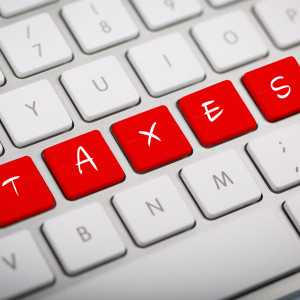The Senate will vote Thursday on a bill containing a permanent ban on taxing Internet access, barring for the first time all state and local governments’ ability to tax web connectivity nationwide.
Senate Minority Whip Dick Durbin agreed to a vote on the customs enforcement conference report containing the Internet Tax Freedom Act this week in exchange for a guarantee from Senate Majority Leader Mitch McConnell for a vote on the Marketplace Fairness Act sometime later this year.
The less-popular latter bill would allow states to tax purchases made online from out-of-state retailers and has the support of lawmakers including Durbin, Tennessee Republican Sen. Lamar Alexander and Senate Minority Leader Harry Reid, who have repeatedly tried to tie the bill to ITFA and guarantee its passage.
Attempts at lumping the two together resulted in seven temporary, often last-minute extensions in recent years, finally slated to come to an end Thursday when the broadly supported ITFA is expected to pass.
“They both deserve their own vote on the floors of each house, but let’s not join them at the hip and prevent real progress from happening here for the Internet and for consumers,” said Robert McDowell, former Federal Communications Commissioner during the Bush and Obama administrations.
In an interview with InsideSources Wednesday, McDowell said it’s important for the Senate to pass ITFA now, as Washington switches into election year high gear, to avoid the risk of falling into a legislative backlog that will be difficult to escape at the last minute.
“If it doesn’t happen now, when is the next opportunity to accomplish what has thus far been a bipartisan idea,” McDowell said. “There are very few legislative days left this year, even though it’s only February, because of the presidential campaign. Congress isn’t going to be in town that often.”
In a Hill op-ed Wednesday McDowell set the stakes for another stall on the ban in the upper chamber, where he said “delaying action could end up burying the Internet access market under an avalanche of state and local taxes, thus stunting America’s world-leading net economy.”
Congress voted to temporarily extend the ban on state and local governments taxing access to bundled Internet services like cable broadband and DSL for the seventh time in 2015’s year-end omnibus. The temporary ban, which exempts certain states that were already collecting a tax on access at the original time of passage in 1998, expires this fall during the last and most heated leg of the election season.
The House passed the permanent extension last year. Passage in the Senate would enforce the ban nationwide, including in Texas, Wisconsin, Ohio, New Mexico, Hawaii, North Dakota and South Dakota, which were exempted in the original 1998 law.
“We have seen Internet deployment and adoption skyrocket in this country in the past 20 years,” McDowell said. “And it was really the policies set by the Clinton administration that led to that, and those policies were essentially a hands-off policy, and to eliminate barriers to entry and adoption. And one big barrier is taxes on Internet access.”
Former undersecretary of commerce for the Clinton administration Ev Ehrlich agreed, and added the tax would be a significant barrier to access for low-income consumers.
“I think the irrationality of taxing Internet access and its harmful effect on social welfare has become more and more apparent as the Internet’s become more ubiquitous,” Ehrlich told InsideSources.
In a January op-ed Ehrlich said similar services with far less utility like telephone, cable and video are taxed around 17 percent and 12 percent respectively, precisely because providers know how willing consumers are to pay.
“There’s no substitute for the Internet and its full range of services,” Ehrlich said. “And that means in many ways its users are prepared to take up the burden, and to tax-hungry local governments, that’s something like the equivalent of a ‘kick me’ sign.”
Ehrlich said such taxes are often regressive and slow consumer adoption, and pointed to Pew Research finding 19 percent of non-Internet users cited “expense of owning a computer or paying for an Internet connection” as their chief barrier.
Another cited study from the Phoenix Center estimated “a 5 percent effective tax rate…would undo the last four years’ adoption gains.” At a 10 percent rate, the study estimated “six years of fixed-line growth would be reversed, returning the adoption rate to the level observed in 2008.”
“That’s a very regressive type of tax that punishes low-income consumers the most,” McDowell agreed. “Had there been high taxes from the beginning, I think we would have seen broadband adoption and Internet usage unfold at a much slower pace than it did.”
McDowell added the government should be working to reduce the cost of what has become a vital service for economic growth and social mobility.
“I think there’s the sense in many communities that a lot of the confusing line items that consumers see at the bottom of their phone bill are Byzantine, but also add a lot of additional costs at a time when consumers are really searching for ways to pay all their bills,” McDowell said.
“Preventing another line item from appearing will only help the proliferation of Internet adoption, and therefore help those who need it the most.”

